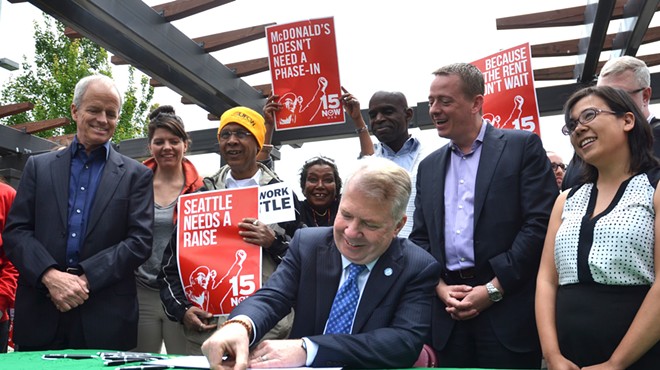Thursday, June 5, 2014
Raising wages in Seattle has reanimated old conversations about the value of work
Lazy, entitled, uneducated burger flippers, the latest menace to society in Washington state, are coming to shut down every small business and inflate prices until no one can buy anything at all. They refuse to get better jobs, they refuse to go back to school, and they want more money. They exemplify the entitlement society we hear so much about in the media and now they want $15 an hour for work that, let’s be honest, could be handled by machines. Earlier this week, Seattle passed a plan to phase in a $15 minimum wage over seven years and depending on who you consult, it’s either the beginning of the end of capitalism, or further proof of an insidious socialist takeover of our beloved free market democracy.
In case your sarcasm filter is shut off, I don’t actually feel this way about minimum wage workers, particularly since I have spent the majority of the past two years as one. The relatively low cost of living here and the lack of financial constraints in my life have made this a fairly comfortable choice for me. I left the better-paying, benefit-providing professional world to make coffee and freelance part time because, frankly, I want to work as little as possible for money. I am in a position where I have the luxury through my circumstances (no car, no kids, no debt) to be much more comfortable in this class than many others are. Technically, I am making poverty wages, but it’s easy to stretch them out in a place like this. On the flip side, it means that I don’t have savings to speak of, need to carefully scrimp and save if I want to travel, and that my health plan involves crossing my fingers and taking lots of vitamins.
Given comments I’ve seen online responding to Seattle’s wage hike and the prospect of it spreading to other cities, there are some misconceptions about minimum wage workers. The dominant perception of the minimum wage worker is the burger flipper referenced above, a person in high school or without college plans supporting their personal expenses, but in fact she is more likely to be college educated, a parent, and over 20 years old than ever before. With over three job seekers for every open position and with the majority of new jobs created since 2010 in the low-wage category, ignorant calls to “get a better job” fall on frustrated ears. It would seem that the only people making this tired argument about burger flippers are people who are insulated from this problem, generally privileged, or retired.
We divide along class lines, but only on the micro level. Small business owners, many of whom are barely scraping by or actually operating at a loss or in debt, are pitted against their own poverty-wage workers. Meanwhile, large corporate monoliths like Walmart and McDonald’s fight to frame their franchises as small businesses, too, despite their incredible profits and CEO pay at 1,000 times (or more) than of frontline workers. The professional class, people who already make a living wage and scrape by more comfortably than we do in the service and retail industries, get offended that a burger flipper or barista should make as much as they do, ignoring their reliance on the cheap labor that gets them their daily latte, dry cleans their suits and cares for their children. We see this misplaced animosity rear its head during conversations about unions, too, while corporate media and corporate-bought policy ignore the real roots and outcomes of incredible wealth inequality.
A fascinating conversation has begun in the wake of the 15 Now! campaign, which has spread to other cities including Spokane in recent months. It has more facets than are possible to cover in one short article. It seems that, for the first time in my lifetime, serious conversations about the failings of capitalism are taking root. As a person whose political views are marginalized by the limited dialogue in this country, I welcome the renewal of a 100-year-old conversation about labor, ownership and the role of work in our lives. At the turn of the 20th century, what is now remembered as the vague “labor movement” was largely split between socialists — who advocated for similar policies that we see their new breed fighting for today — and anarcho-syndicalists who were more interested in radically altering the role of work, technology and ownership altogether. These were not wholly separate philosophies and there was enough overlap in belief that the groups worked together to achieve labor gains, including the eight-hour day, the weekend, paid vacation and sick leave, and safety for industrial workers.
During this time, the same debate we hear today was unfolding regarding the role of the state in regulating the market. Both free market fundamentalists and the new Keynesian intervention believers foresaw a future in which either the market alone or with help from the state provided broad prosperity and advances in technology that relieved most people from the sweat of prolonged labor. John Maynard Keynes predicted in 1930 that the biggest problem of the following decades would be boredom and a failure to know how to appreciate our extensive leisure time. He guessed that “we shall endeavour to make what work there is still to be done to be as widely shared as possible. Three-hour shifts or a fifteen-hour week may put off the problem for a great while. For three hours a day is quite enough to satisfy the old Adam in most of us!”
Thirty years later, at the World’s Fair, Isaac Asimov shared his thoughts about work in our time. “The world of A.D. 2014 will have few routine jobs that cannot be done better by some machine than by any human being. The lucky few who can be involved in creative work of any sort will be the true elite of mankind, for they alone will do more than serve a machine.
“Indeed, the most somber speculation I can make about A.D. 2014 is that in a society of enforced leisure, the most glorious single word in the vocabulary will have become work!”
Both predictions could have come true by now, I think, were it not for increased consumerism fueled by aggressive advertising and cheap goods, and a new category of jobs that emerged in the vague category of administration, management and general bureaucracy maintenance. These jobs represent the shift from an economy focused on creating stuff, to one that largely manages data, strategizes about ways to keep consumerism growing, and endlessly perpetuates itself through consulting, training and brainstorming. The people in these relatively new fields work long hours and generally receive more than minimum wage. They support those in the service industry including restaurant workers, fast food, retail, child care and building maintenance, most of whom make minimum wage. Were they not working so much to maintain their lifestyles, they would have the leisure time to cook for themselves, brew their own morning coffee and tend to their own children. The cycle continues forward instead as people strive to outpace their student, housing or credit card debt while wages stagnate and inflation soars. The family of 2014 requires the equivalent of three 1960s breadwinners to make ends meet. This means both parents at work and a credit card, a single mom working three part-time jobs (a situation George W. Bush once lauded as “uniquely American”), or living on less than a technically livable amount each month.
Ongoing economic desperation has been so normalized that college graduates in my generation simply expect to work for free for a significant time in order to earn the opportunity to work for pay. I have observed my peers cheering a new service, SponsorChange, which pays down student loan debt in exchange for volunteer hours with various nonprofits and charities. To a population already convinced that they need to work for free, and take on tens of thousands in debt before earning a spot at the job market table, this sounds like a sweetheart deal. On second glance, though, the arrangement is a literal reboot of the indentured servitude that brought so many to the U.S., rather than into the job market debt-free, three hundred years ago. This phenomenon is part of the broader issue of the important work that some of these groups do, like environmental restoration and direct level human services, being undervalued by market forces. There is work to be done, but finding a paid gig that helps people is a complicated undertaking. It turns out that in a system that values growth at all costs, undoing the problems created by the growth is the work least valued by the mystical market.
The next few years promise to be an interesting time to be alive and to be working. I hope to see a mass shift in priorities and a disillusionment with the man-made ideas of debt, labor and the dignity of work. Sure to be called an irrational idealist, I believe we can have more wealth, more equality, less destruction, fewer hours spent working and more fun. Perhaps the arguments and conversations and, above all, the results of raising wages in Seattle and across the country can continue to spur us into different modes of thinking and acting at work and in the public sphere. ♦
Taylor Weech, who hosts the weekly public affairs program Praxis on KYRS-FM, is a Spokane writer and activist. She's advocated, among other things, for environmental sustainability and all-ages access to the arts.
Tags: commentators , minimum wage , Comment , Image






















